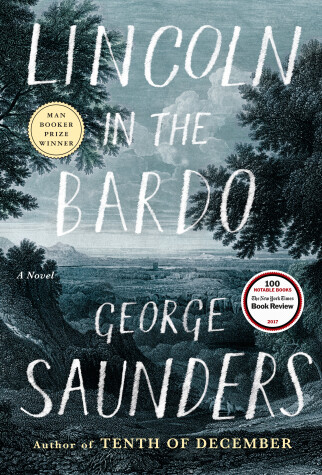Reviewed by gmcgregor on
It is this situation, the heartbroken Lincoln going to see his dead son, that inspired lauded short-story writer George Saunders' first novel, Lincoln in the Bardo. The bardo is based on the Tibetan concept of a liminal state between life and death, fairly similar to the Catholic purgatory but without the connotations of having done something "wrong", and the Lincoln in question is not Abraham but Willie himself. It is his soul that comes to the bardo, where he encounters other spirits, those who have elected to stay. They don't believe themselves quite dead...they refer to their coffins as "sick-boxes" and are sure that they'll soon recover and get back to their lives as they knew them. But they all know that children aren't supposed to linger, they're supposed to move on. And Willie is more or less ready to do so when his father appears, to hold him and talk to him, and promises to come back. So now Willie, too, wants to stay.
There are three main ghosts/spirits/souls that take on the task of trying to figure out how to inspire Willie to move on: Hans, Roger, and Everly. Hans was an older shopkeeper who remarried after the death of his first wife. He waited to consumate his second marriage until his young and lovely bride was comfortable, and after months, she's finally ready to do so...and then Hans is struck violently in the head by a wayward beam. Roger was a young gay man who managed to find love in a time when that was difficult...only to get dumped and slit his wrists in despair. As he bled, he realized how beautiful the world was and how much he wanted to live. And then there's Everly, a former reverend who lived righteously but is too afraid of heavenly judgment to go. They try everything, including communing with the President, to get Willie going where he needs to go.
This is a very odd novel. It's mostly structured like a play...dialogue is followed by a notation of the speaker's name. Then there are occasional sections where Saunders excerpts nonfiction historical sources to describe various aspects of the situation at hand: the party the Lincolns hosted at the White House the night Willie lay dying, what Lincoln actually looked like, what Willie was like, the day of the funeral. There's no traditional "narrative" at all. I'll admit that this made it a bit of a struggle to get into...I don't usually especially enjoy reading plays, and there's not a lot of information provided about what's going on and who the various characters are right off the bat. But my reluctance to put down books before I've finished them paid off here, because once I got into the flow of it, I found the back half quite strong and the ending unexpectedly powerful.
I've never read any of Saunders' short stories, but I'm excited to do so in the future because the sheer inventiveness of this novel is delightful. As someone who loves The Divine Comedy, I enjoyed his take on Dante's technique of contrapasso, giving the spirits physical manifestations matching the reason they won't leave the bardo. Although it won the Booker Prize for its release year (which was awarded the day after I finished reading it!), this is a novel destined to be divisive and one that I'd therefore hesitate recommending widely even though I personally enjoyed it. If you're looking for a straightforward form or narrative, or something more traditionally "historical fiction", this isn't for you. But if you're interested in a more unusual reading experience that challenges you to read in a different way, I'd encourage you to at least give it a try!
Reading updates
- Started reading
- 17 October, 2017: Finished reading
- 17 October, 2017: Reviewed
